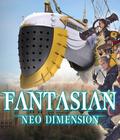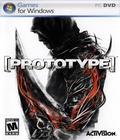In the first minutes of Prototype, the game manages to set itself apart as gory, ultra-violent, hectic and almost schizophrenically frantic in combat. It opens with a blood-drenched, adrenaline-fueled dash down a major Manhattan street, letting you cleave, gash, gore and throw soldiers, tanks and mutants. As soon as you're done leveling the area and eliminating everything you can get your hands on, however, it jumps back to your first day as a superhuman killing machine, taking away all the shiny flashy weapons originally at your disposal and making you claw your way to the top.
The flashback format doesn't take away any of the feel of the game, though. Almost as soon as you wake up in a morgue and wander out into the fully realized Manhattan Island, you're back to being an ultra-violent killing machine, even if your strengths and enemies are a little toned down. Within minutes, you'll be throwing cars at helicopters and consuming enemy soldiers like they're Fruity Pebbles, just to try and figure out who you are. The plotline is bare and almost incomprehensible, but needing to eat people to gain their memories is a very good excuse to roam around and cause as much mayhem as possible.
You progress through the story by taking on missions at yellow markers. The overworld map is well organized, and getting around New York as protagonist Alex Mercer is almost obscenely easy. As long as Mercer is dashing and not encased in some sort of armor, he can barrel down streets, hop over cars and small obstacles, run up walls, and even glide and dash in the air. Military personnel will call you out and start chasing you, but only if you're ridiculously obvious. You can go flying right next to a helicopter and fall a hundred stories, and the worst that will usually happen is passing soldiers glaring at you for a few seconds until you leave the area. Considering the fact that you're supposed to be priority number one for every military scout in the city, the world is almost completely consequence-free. If you transform in front of someone or pick them up and eat them, you might be noticed, but otherwise, you're in the clear.
The developers seem to use this to encourage destructive behavior. They've provided a big fat sandbox of a city for you to play around in and an experience system reminiscent of the scoring in early Grand Theft Auto games, where just about every act of destruction racks up points. If you slice up a city block while no one's looking, you'll have a whole new set of points to spend upgrading Alex's various movement and combat moves, as well as improving his speed, health and other things. You'll still get them faster by completing story missions or side missions, though. Having an objective makes the game much faster and more interesting because you can only throw people into a crowd hard enough to make them explode a few times before it loses its charm.
The defining feature of an open-world game tends to be the little stuff you can do outside of missions, so it's this lack of content that really made me question the point of making the game a non-linear event. There are side-quests to accomplish, but what's there to do between them? Well, to put it bluntly, nothing. You can run around and beat up or eat people, sometimes profitably, but that gets old almost as quickly as the option is presented. Even the optional objectives are dull, repetitive and often frustratingly brutal. Objectives include wiping out infected as a soldier, killing dozens of soldiers using a variety of powers, dashing across rooftops and locating key personnel to assimilate. Nothing in that set list is particularly nasty, but as more and more are unlocked, it quickly becomes a list of chores instead of anything enticingly challenging or astoundingly rewarding. Your reward for doing well in anything is exactly the same: more evolution points with which to upgrade.
When you get right down to it, Prototype is a brawler. It's a brawler steeped in extra little niceties like the ability to flee up walls, eat people for health and hijack some tanks and helicopters when overwhelmed. These really help out when you get out of your league, with seven assault teams on your tail and two tanks following up behind, but most of the game is played on the ground, mashing between the two different attack buttons and trying to actually use the combos you've purchased. And that part's great. It can be a little hard to remember which mouse buttons to click when, in combination with what, and in what battle mode, but combat is meant to be hectic, tough and unpredictable. The only part the game has trouble with is switching between the five different attack modes, which requires a held button and selection with the mouse. Sometimes the game refuses to register the decision you made, and sometimes it takes a minute of hectic combat to actually switch over, which, of course, leads to personal pain and injury. Fortunately, Alex is usually overpowered or overdefended to extremes, keeping the game from being a frustrating mess.
The big exception to this, though, is the boss fights, which seem to have been developed when the developers forgot they were making a brawler. In these fights, which are always larger than life but thankfully rare, almost all standard combos are ineffective and lead to instantaneous death. The super-monsters tend to be able to knock the heck out of you in one endless combo, leaving you crippled and near death almost before you have time to click your second attack button. In order to win, you must find ways to exploit features of the game, like Overdrive Devastators, which let you deal massive unblockable damage if you gain health past your normal life bar. If you don't find ways to hide out and plan awkward and often tedious chipping strategies, you're going to be killing Mercer again and again.
The larger-than-life encounters, though, at least fit the tone of the game. Everything is over-the-top, from the almost excruciating size of the city to the plot, to the expletive-filled dialogue to even the sound effects. For some reason, the game is uncontrollably much louder whenever the mayhem starts, but the actual sound quality is still impeccable. All the military banter, over-dramatic dialogue, brutal explosions and slick slashing and ripping sounds are pitch-perfect, to a fault. There's a lot of noise in the game, so it starts to overlap itself a lot. Subtitles are a must, especially in the "web of intrigue" cut scenes, which are intentionally staticky and a little garbled. The scenes are also just about perfect, though, done with all the confusion of real thoughts and covered in the sticky red overtones of Alex's infected mind. They are a concept executed precisely in-line with the themes of the game.
It's a slick game overall. The graphics are top-notch, even if the hundreds of buildings are generic and not very interesting. The detail on the hordes of people is pretty spectacular, especially considering the levels of constant mayhem and destruction characterizing the last half of the game. There are almost no inherent technical issues, and it even runs just as perfectly in 720p. The sound can be a little buggy, but that's the only true complaint with the technology of the game.
Prototype has a few flaws. It seems to forget what it's good at with all its focus on the sprawling overworld, and the open-ended gameplay has no real purpose other than prolonging the progression of the game, but it's still a remarkably well-made package. The story, while bizarre to the point of incoherency, holds together the game and led to the worthwhile "web of intrigue." The developers created an excellent game world to play out the missions in; it's just a shame that they couldn't do something more interesting with it in between missions.
Score: 8.0/10










 Prototype tells the story of Alex Mercer - a man haunted by his past, fighting a secret war in New York City. As the action spirals out of control, a conspiracy tied to his origins threatens the future of mankind itself. Mercers amazing shapeshifting powers allow him to become an exact replica and steal the skills or powers of anyone who crosses his path.
Prototype tells the story of Alex Mercer - a man haunted by his past, fighting a secret war in New York City. As the action spirals out of control, a conspiracy tied to his origins threatens the future of mankind itself. Mercers amazing shapeshifting powers allow him to become an exact replica and steal the skills or powers of anyone who crosses his path.
































